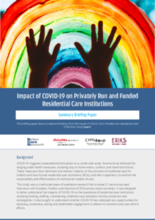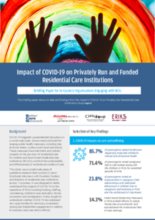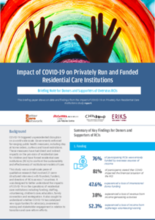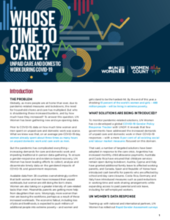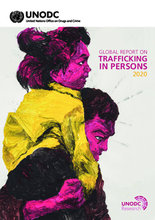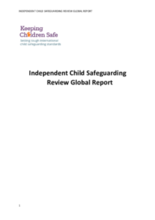Displaying 1121 - 1130 of 4424
This briefing paper draws on data and findings from the report: Impact of COVID-19 on Privately Run Residential Care Institutions: Insights and Implications for Advocacy and Awareness Raising.
This briefing paper draws on data and findings from the report: Impact of COVID-19 on Privately Run Residential Care Institutions: Insights and Implications for Advocacy and Awareness Raising.
This study was a small-scale piece of qualitative research that involved 21 semistructured interviews with founders, funders, and directors of RCIs across 7 countries. It was designed to better understand the impacts of COVID-19 on the operations of residential care institutions including funding, staffing, volunteering, children’s care, education, family connection and reintegration.
This Guide was created as a resource for the adaptation and scale up of a country's unique action plan to address violence against children.
INSPIRING Ways to End Violence Against Children's new series of podcast episodes explore organisations’ efforts to protect children – and adapt to challenges – during COVID-19.
This brief from UN Women explores who is shouldering the increased burdens of household care in light of the pandemic lockdowns and other restrictions and by how much those burdens have increased.
The COVID-19 Global Gender Response Tracker monitors responses taken by governments worldwide to tackle the pandemic, and highlights those that have integrated a gender lens.
The Safeguarding Resource and Support Hub (RSH) aims to support organisations in the aid sector to strengthen their safeguarding policy and practice against Sexual Exploitation, Abuse and Sexual Harassment (SEAH).
This report draws on data from 148 countries and explores issues of particular relevance in the current crisis, including the impact of socio-economic factors, drivers of child trafficking and trafficking for forced labour, and traffickers’ use of the internet.
The Independent Child Safeguarding Review (ICSR) was commissioned by the International Senate of SOS Children’s Villages to find ways to address the complex topic of child safeguarding failures. The report sets out consolidated findings and recommendations from four country reviews with the aim of contributing to improvements in safeguarding practice.

